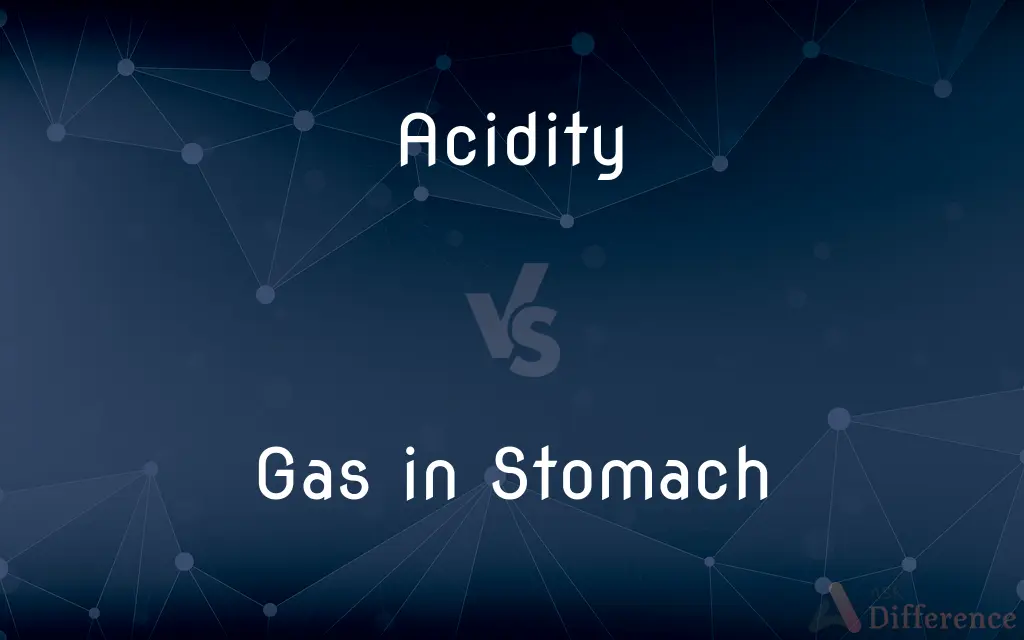Acidity vs. Gas in Stomach — What's the Difference?
By Tayyaba Rehman — Published on November 11, 2023
Acidity refers to excessive stomach acid, while gas in the stomach is trapped air or other gases.

Difference Between Acidity and Gas in Stomach
Table of Contents
ADVERTISEMENT
Key Differences
Acidity is the condition where the stomach produces an excess amount of hydrochloric acid. Gas in the stomach, on the other hand, refers to the accumulation of air or other gases in the digestive tract, which may be swallowed or produced during digestion.
Acidity can cause a burning sensation in the chest or upper abdomen, commonly known as heartburn. Gas in the stomach can lead to feelings of fullness, bloating, belching, or even pain.
Acidity is often a result of consuming spicy foods, excessive caffeine, or having certain medical conditions like GERD. Gas in the stomach can be a result of consuming carbonated drinks, certain foods that are hard to digest, or swallowing air while eating.
Over-the-counter medications can help in reducing acidity by neutralizing stomach acid or reducing its production. To alleviate gas in the stomach, anti-gas medications or simethicone can be taken.
Acidity and gas in the stomach can often coexist, causing discomfort. While acidity primarily affects the stomach and esophagus, gas in the stomach can also impact other parts of the digestive system, including the intestines.
ADVERTISEMENT
Comparison Chart
Definition
Excessive production of stomach acid.
Accumulation of air or other gases in the stomach.
Causes
Spicy foods, caffeine, certain medical conditions.
Carbonated drinks, hard-to-digest foods, swallowing air.
Symptoms
Heartburn, burning sensation in the upper abdomen.
Bloating, belching, pain, feeling of fullness.
Treatment
Antacids, proton pump inhibitors, H2 blockers.
Anti-gas medications, simethicone.
Affected Area
Primarily stomach and esophagus.
Stomach and other parts of the digestive system, including intestines.
Compare with Definitions
Acidity
The presence of a sour environment in the stomach.
Drinking milk might help to neutralize acidity.
Gas in Stomach
Bloating or belching due to trapped air.
He felt a lot of gas in the stomach after eating beans.
Acidity
An imbalance in the stomach's pH level.
He took an antacid tablet to combat his acidity.
Gas in Stomach
Digestive disturbance leading to trapped gases.
Eating too fast can result in gas in the stomach.
Acidity
Excess production of stomach acid.
Overeating can increase acidity in the stomach.
Gas in Stomach
Excessive air swallowed during eating or drinking.
Taking smaller sips might reduce the chance of gas in the stomach.
Acidity
A condition leading to heartburn and discomfort.
She felt acidity after consuming a lot of spicy food.
Gas in Stomach
A feeling of fullness and discomfort.
She wanted to lie down because of the gas in her stomach.
Acidity
The state, quality, or degree of being acid.
Gas in Stomach
Accumulated air or gases in the digestive tract.
Drinking sodas can lead to gas in the stomach.
Acidity
Hyperacidity.
Acidity
The quality or state of being acid.
Acidity
Sourness; tartness; sharpness to the taste.
The acidity of lemon juice
Empty stomachs lead to acidity and leave a sour taste in the mouth.
Acidity
(pathology) Excessive acid quality, as in gastric secretions.
Acidity
(figurative) A caustic, sour, biting, or bitter quality.
Acidity
The quality of being sour; sourness; tartness; sharpness to the taste; as, the acidity of lemon juice.
Acidity
The property of being acidic
Acidity
The taste experience when something acidic is taken into the mouth
Acidity
PH values below 7
Acidity
Elevated levels of HCL in the stomach.
Avoiding caffeine can help reduce acidity.
Common Curiosities
What is Acidity?
Excessive production of stomach acid causing discomfort.
How is Gas in Stomach different from Acidity?
Acidity refers to excessive stomach acid, while gas is trapped air or other gases.
What causes Acidity?
Consuming spicy foods, excessive caffeine, or having medical conditions like GERD.
How can I reduce Acidity?
By eating smaller meals, avoiding trigger foods, and taking over-the-counter medications.
Which foods commonly lead to Gas in Stomach?
Beans, broccoli, carbonated drinks, and some dairy products.
Can Acidity and Gas in Stomach coexist?
Yes, they can often coexist, leading to increased discomfort.
What foods can trigger Acidity?
Spicy foods, fatty foods, caffeine, and citrus fruits.
What treatments are available for Acidity?
Antacids, proton pump inhibitors, and H2 blockers.
Does drinking water help with Gas in Stomach?
Drinking water can help move trapped gas through the digestive system, but excessive gulping can add to it.
What is Gas in Stomach?
Accumulation of air or other gases in the digestive tract.
Is Acidity a chronic condition?
It can be, especially if associated with conditions like GERD.
Is Acidity harmful in the long run?
Chronic untreated acidity can lead to complications like ulcers or Barrett's esophagus.
What are the symptoms of Gas in Stomach?
Bloating, belching, pain, and a feeling of fullness.
How can I alleviate Gas in Stomach?
Anti-gas medications, dietary changes, and avoiding carbonated drinks.
Why do I get Gas in the Stomach frequently?
It could be due to dietary choices, swallowing air, or certain digestive disorders.
Share Your Discovery

Previous Comparison
SP Recording vs. LP Recording
Next Comparison
Red Antifreeze vs. Green AntifreezeAuthor Spotlight
Written by
Tayyaba RehmanTayyaba Rehman is a distinguished writer, currently serving as a primary contributor to askdifference.com. As a researcher in semantics and etymology, Tayyaba's passion for the complexity of languages and their distinctions has found a perfect home on the platform. Tayyaba delves into the intricacies of language, distinguishing between commonly confused words and phrases, thereby providing clarity for readers worldwide.












































